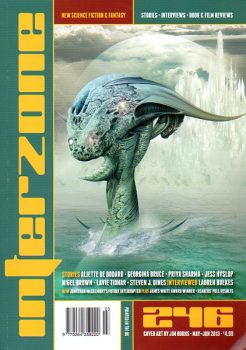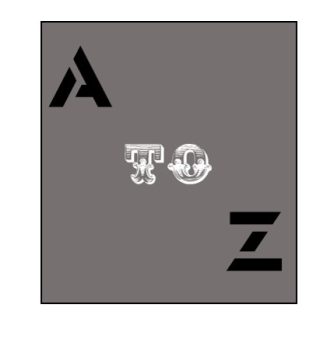A to Z Reviews: “Triolet,” by Jess Hyslop
Jess Hyslop’s “Triolet,” which appeared in the June 2013 issue of Interzone is another high concept story in which the reader is asked to suspend their disbelief by accepting Hyslop’s far-fetched idea, in this case Mrs. Entwhistle, who grows flowers which recite poetry when a person brushes against them.
The first indication that these flowers are anything special is when Lisa and James Lewis pass by her garden on their way to work and brush against a flower, which recites a poem. Although the two love the poetry plants, they are merely part of their shared experience on the way to work until they learn that Mrs. Entwhistle had given a plant to a friend of their. The knowledge that they could, conceivably, own a plant began to take root in their minds.

Eventually, Mrs. Entwhistle called to them as they walked by on their way to work. Lisa convinced James they could be late to work and go in. Sure enough, Mrs. Entwhistle had a plant that she felt was perfect for the couple. They took it home and discovered it had the perfect poem for their relationship.
Although the science fictional conceit of the story is the plants that can recite poetry, the real crux of the story is the fact that poetry is highly subjective. Even moreso than prose, poetry is reliant on the interpretation by the listener or reader. In “Triolet,” James and Lisa’s understanding of the meaning of the poem and what it says about their relationship (if, indeed, it says anything) changes in time for each of them.
“Triolet” is a reflection of what poetry is and how it can mean different things to different people, the same thing to different people with shared experience, or can change its meaning as a person’s point of view changes. Just as flowers grow, blossom, wither, and die, so, too, are poems mutable. The poem you know today isn’t the poem that you’ll read in a week, even though the words and meter of the poem itself haven’t changed.
The changes that result in James’ reinterpretation of the poem seem sudden and he appears poorly equipped to handle them as an adult, which weakens the story from a plot and character perspective, but the important part of the story, what it has to say about poetry’s impact on a person’s life, remains intact.
 Steven H Silver is a twenty-time Hugo Award nominee and was the publisher of the Hugo-nominated fanzine Argentus as well as the editor and publisher of ISFiC Press for eight years. He has also edited books for DAW, NESFA Press, and ZNB. His most recent anthology is Alternate Peace and his novel After Hastings was published in 2020. Steven has chaired the first Midwest Construction, Windycon three times, and the SFWA Nebula Conference six times. He was programming chair for Chicon 2000 and Vice Chair of Chicon 7.
Steven H Silver is a twenty-time Hugo Award nominee and was the publisher of the Hugo-nominated fanzine Argentus as well as the editor and publisher of ISFiC Press for eight years. He has also edited books for DAW, NESFA Press, and ZNB. His most recent anthology is Alternate Peace and his novel After Hastings was published in 2020. Steven has chaired the first Midwest Construction, Windycon three times, and the SFWA Nebula Conference six times. He was programming chair for Chicon 2000 and Vice Chair of Chicon 7.

Part of the appeal of this series is seeing which authors show up at the beginning and end of the list for each letter!
I must have read “Triolet” in Interzone, but I admit I don’t remember it.